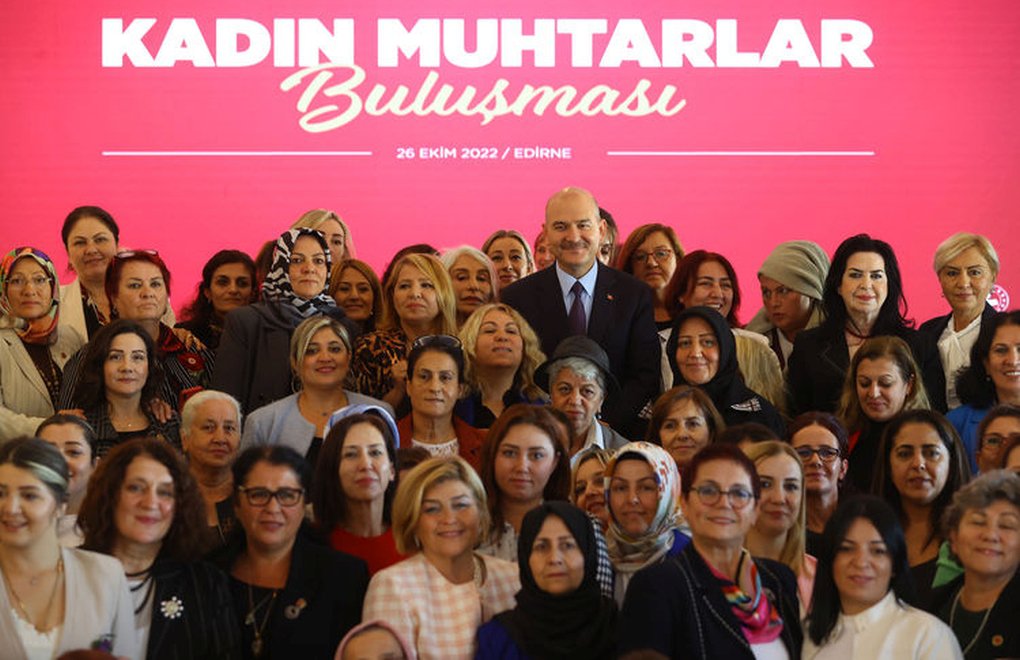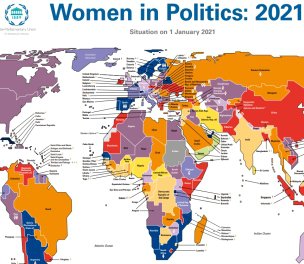Interior Minister Süleyman Soylu met women mukhtars on October 26 in Edirne, northwestern Türkiye. (Photo: AA)
Women make up only about 2.2 percent of the mukhtars, or neighborhood and village heads, in Türkiye, according to data from the Global Equality and Inclusion Network Association.
There are 50,491 mukhtars in Türkiye, the data shows. Over 32,000 of them are in urban neighborhoods, and 18,291 are in villages. Only 1,122 of the mukhtars are women.
Figures from last year show that in the 962 neighborhoods of İstanbul, around 150 of the mukhtars are women. In the districts of BesikBeşiktaş tas and Kadıköy, the percentage of women mukhtars is the highest, with 61 percent and 57 percent of the mukhtars being women, respectively.
A mukhtar is an elected village/neighborhood head. These neighborhood representatives are elected every five years, and political parties are not allowed to appoint candidates for these posts.
This tradition of elected resident officials dates back to Ottoman times. Mukhtar comes from the Arabic meaning: "The Chosen One". The mukhtar allows for citizen participation at the neighborhood scale, as every (urban) neighborhood has a public office for and in the area.
There have been several attempts to close the mukhtarship in 1913 and 1933, but it still exists. According to the 2005 Municipal Law the mukhtar's responsibilities are, among others: "defining the common needs, improving the life quality of the neighborhood, mediating the relationship with the municipality and other public bodies, delivering opinion about matters related to the neighborhood, and coordinating with other institutions."
In 1933, the first women Mukhtar was Gülkız Ürbül. She was elected in the Demircidere, a village around 130 kilometers from Izmir.
Role of women mukhtars
The Association for Supporting Women Candidates (KA.DER) made a statement for Womens Mukhtars Day, which was marked on October 26. KA.DER called on us to take steps to increase the representation of women in the mukhtar institution. The organization stressed the importance of equal representation for mukhtarship.
"It is possible to have equal representation in all decision-making mechanisms. But more importantly, it is necessary. Because women mukhtars not only help solve women's problems in their own neighborhoods but also fulfill an important duty in ensuring participation."
"In this context, the fact that women are not represented equally in the mukhtarship institution means a restriction on women's voice from the most fundamental and local level.
"It is critical to support women mukhtar candidates to solve the problems of local women from a women's point of view."
Women's political representation
According to a report by the World Economic Forum 2022 report on the Global Gender Gap Index, Türkiye ranks 112 out of 146 on political empowerment. Political representation has increased significantly within the Parliament, going from 4.7 to 17.4 between 2010 and 2020, however, women's political participation, especially in local administrations, remains minimal.
The Mukhtar, in particular, is considered to be an 'in-between' position. While elected public servants, they largely lack the legal, financial, and political means to represent the population. They mainly work as daily intermediaries between local society and the state.
This micro level of the political domain remains dominated by men. According to social research, women mukhtars must degender and regender and use women stereotypes. For example, proposing the idea that political leadership is about communication and intimacy in this communication process plays a crucial role; therefore, 'women are better mukhtars'. While simultaneously also degender, highlighting their 'professional gender-neutral attributes', placing their mukhtar identity over that of a being woman. (WM/VK)








